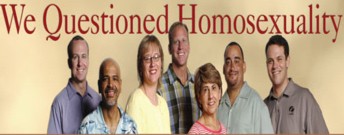Quit Ho Mo: Undercover with the ex-gays: Part II
This is the second installment in a two-part series on Christian reorientation therapy. The first part, which you can read here, appeared in Outlook Weekly in June of 2008, the second part ran in September of 2008. There’s also a radio interview I did with the editors of Outlook, since the second, longer piece was a cover article for Outlook Weekly. That can be listened to here.
“One night, at dinner, when I was a kid, my father told us that the reason Mt. St. Helens had erupted was so that God had a place to put all the faggots.”
A few months ago, I subjected myself to what amounted to intellectual and moral torture, pretending to be a person suffering from “sexual brokenness,” and trying to amend my ways by attending meetings that would, I guess you could say, un-gay me.
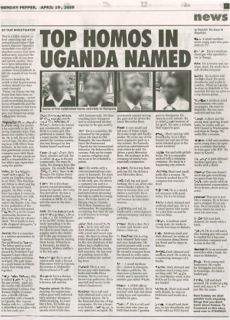 I wrote an article for this very paper and promised a second part, but as I was attempting to write it, I really wanted to know how this sort of shame and self-loathing came about. It was too frustrating to consider that these people were just sheep, especially not knowing why they were sheep. It would be okay if they were stupid, but no one appeared that way.
I wrote an article for this very paper and promised a second part, but as I was attempting to write it, I really wanted to know how this sort of shame and self-loathing came about. It was too frustrating to consider that these people were just sheep, especially not knowing why they were sheep. It would be okay if they were stupid, but no one appeared that way.
After attending two larger meetings and discussions (which didn’t just cover homosexuality, but abstaining from masturbation, sex dreams, sexual thoughts, etc.), I went to a more specific, gay focused meeting. I read books, watched movies, and I interviewed people who had gone through the process and either gotten out, or were still in it. Because I respect these people’s privacy (as well as the fact that some were interviewed thinking I was in treatment), I will be using pseudonyms. It would also seem unfair to expose them, because they aren’t the target of my investigation, but rather how they were taken in.
“What happened to me is that, I was just in the closet til I was a lesbian, which was probably, I don’t know. I mean even when I was 4 or 5, I knew that I liked girls, but it was in high school… I fooled around with some of the girls but I always thought I would grow up and find a guy.”
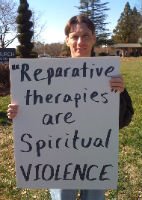 Mary came of age in the mid-late 1960’s, long before homosexuality was taken off the AMA’s list of mental illness. After a long struggle to find out she was, she eventually came out and became the head of one of the largest gay organizations in the country.
Mary came of age in the mid-late 1960’s, long before homosexuality was taken off the AMA’s list of mental illness. After a long struggle to find out she was, she eventually came out and became the head of one of the largest gay organizations in the country.
“There was one moment, I was lovers with my best friend in high school, there was one moment where I realized she was going to change and I wasn’t… What I was doing wasn’t play … I had never met gay people… I hated myself because I felt so awful about it… Didn’t stop me. Didn’t stop my fantasies. Didn’t stop my trying to have sex with girls… And then I went off to college and I fell in love my freshman year with a girl who was fooling around with me, but she had a boyfriend back home… She kinda freaked out on me… I think what happened to me was, we were writing letters to each other, and I think her parents found one of the letters and flipped out.”
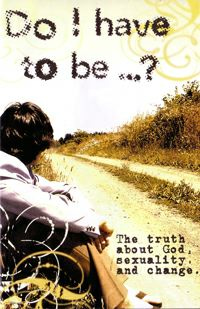 “When my brother picked me up and drove me home, he told me that someone had told our parents that I was a lesbian. Of course I was mortified…They were very upset, but I lied to them and told them I was bisexual. ‘What did we do to make you like this?’… I thought I was an absolute freak… They told me that I should talk to [my lover’s] parents. Her parents had told the dean of the college that they should quit school because I was a lesbian… That night we went over to their house for more grilling. It was more grilling from [her lover’s] parents. She was off somewhere, they’d sent her away. She was probably with her boyfriend… My parents weren’t that educated, but these people were very wealthy and well educated and they intimidated my parents… My parents asked me ‘did I wanna leave school?’ I said, ‘no I don’t wanna to leave school…’ So we went to see the dean of the college and he told me that ‘the only way you can come back here is if you get help, see a therapist three times a week and you need to change… Otherwise you had to leave school…’ “
“When my brother picked me up and drove me home, he told me that someone had told our parents that I was a lesbian. Of course I was mortified…They were very upset, but I lied to them and told them I was bisexual. ‘What did we do to make you like this?’… I thought I was an absolute freak… They told me that I should talk to [my lover’s] parents. Her parents had told the dean of the college that they should quit school because I was a lesbian… That night we went over to their house for more grilling. It was more grilling from [her lover’s] parents. She was off somewhere, they’d sent her away. She was probably with her boyfriend… My parents weren’t that educated, but these people were very wealthy and well educated and they intimidated my parents… My parents asked me ‘did I wanna leave school?’ I said, ‘no I don’t wanna to leave school…’ So we went to see the dean of the college and he told me that ‘the only way you can come back here is if you get help, see a therapist three times a week and you need to change… Otherwise you had to leave school…’ “
“My parents sent me to a psychiatrist… It was a lot of money, like $50 a session which was a lot in those days… His goal was to change me… He was going to use Freudian analysis to fix it… My roommates would tell me that I was normally fine, except when I would come back from therapy, they told me I should stop… And I felt really bad because my parents didn’t have any money and they were paying for this, so [after a year] I told them it worked, I was fine, I was cured and I think I should stop… [With the psychiatrist] He asked me to tell me his life story, he said very little… He went with the Freudian theory that we would go through my life and figure out what went wrong, as if anything had. He mostly thought it was about my relationship with my father… I was a shy girl so the fact that he didn’t say anything made it very embarrassing… Just so you know, I ended up with a degree in psychology…”
“I did eventually find a therapist who was helpful, a grad student. He asked me what my problem was and I said that I was gay. And he said ‘so what’s the problem?’… And that was the new start of my life.”
 One of the main reasons I think it is important to hear Mary’s entire story is to get a sense of change socially and within the church. You’d think that over a 40 year period, ideas and attitudes would relax a little bit, but I didn’t find that. It wasn’t just that the groups would use (other than the bible) 30 year old texts, but that everyone was stuck in some sort of time machine of shame.
One of the main reasons I think it is important to hear Mary’s entire story is to get a sense of change socially and within the church. You’d think that over a 40 year period, ideas and attitudes would relax a little bit, but I didn’t find that. It wasn’t just that the groups would use (other than the bible) 30 year old texts, but that everyone was stuck in some sort of time machine of shame.
I saw this even more so with John, who was stuck in various re-orientation therapies for eight years, through the 1990’s. The quote about Mt. St. Helens was something his father said to him at a young age and shaped his self-hatred for years.
“I grew up in the United Methodist Church; my father grew up as a Southern Baptist… When I was growing up, I actually believed that the bible was the inspired word of God, that a person has to be born again in order to go to heaven… I think I knew I was attracted to men somewhere in 5th grade… My original thought was it was a phase that I would grow out of. I was told it couldn’t be natural behavior… Every night I would pray to God to change me… That lasted until my 19th birthday… For a short term I rejected Christianity, I was very depressed and became an Atheist. I thought there was nothing else I could do to get to heaven. I prayed every night and God wasn’t answering, and thought God must not exist… I got very depressed and that’s eventually how I got saved…”
 “I made two friends whose entire goal was to try to save me. Only one of them knew I was gay… They were shocked that after I was saved that it was still an issue. They assumed that once I turned to Christ that everything would be solved…I was supposed to get baptized, my father insisted that as children we would have some choice in the matter… But right before I was supposed to be baptized, I was with a guy. I told the pastor, because I was supposed to confess everything like a good Christian. And so he called off the baptism. And of course I had to tell my parents… My father knew that a pastor doesn’t schedule a baptism and then call it off because ‘you’re not ready,’ unless something happened… Around the same time I went to a conference in California and met some of the original leaders of Exodus [the most prominent early sect of the ex-gay movement] and found out I wasn’t going to be healed overnight…. I found out about the books and meetings and it was at that time I went to my dad and told him I’d been struggling with homosexuality. I kick myself now because he thinks I’m cured, because he said ‘well if you’ve been struggling with this for ten years, are you sure you’re not just setting yourself up for heartache by trying to change?’… In retrospect I should have used that opportunity to tell him the truth, but no, I told him it was unnatural and I was going to change… I was already sold on the idea that I could change, I was brought up that homosexuals should be killed…”
“I made two friends whose entire goal was to try to save me. Only one of them knew I was gay… They were shocked that after I was saved that it was still an issue. They assumed that once I turned to Christ that everything would be solved…I was supposed to get baptized, my father insisted that as children we would have some choice in the matter… But right before I was supposed to be baptized, I was with a guy. I told the pastor, because I was supposed to confess everything like a good Christian. And so he called off the baptism. And of course I had to tell my parents… My father knew that a pastor doesn’t schedule a baptism and then call it off because ‘you’re not ready,’ unless something happened… Around the same time I went to a conference in California and met some of the original leaders of Exodus [the most prominent early sect of the ex-gay movement] and found out I wasn’t going to be healed overnight…. I found out about the books and meetings and it was at that time I went to my dad and told him I’d been struggling with homosexuality. I kick myself now because he thinks I’m cured, because he said ‘well if you’ve been struggling with this for ten years, are you sure you’re not just setting yourself up for heartache by trying to change?’… In retrospect I should have used that opportunity to tell him the truth, but no, I told him it was unnatural and I was going to change… I was already sold on the idea that I could change, I was brought up that homosexuals should be killed…”
“Later on, when I was on a Christian public access TV show, I was told by a confidant that I should probably tell my mother, in case she knew someone who’d seen it. I did and she said, ‘I’m sure once you get through your counseling everything will be better’… The one thing I specifically remembering saying was when a few people asked me questions starting with ‘when you were gay,’ and I interrupted them and said, ‘there’s no “were gay,” I’m going through counseling and I will get through it.’”
 “The books I had to read mostly dealt with ‘improving’ your masculinity, absent father, strong-willed mother stuff… In terms of believing people were sincere when they said they had changed, in three years [at the first place] I only heard three or four people say it, and yes I believed they were sincere, at the time… Mario Bergner [one of the major pioneers of the ex-gay movement], I knew quite well, and he made the very confusing statement that ‘I no longer suffer from homosexual desire, but I still suffer from homosexual temptation.’ 12 Years later, I still have no idea what the fuck that means…I believed the books I read. My perception of anyone who would go to these meetings is that what you’re doing is wrong and you have to change it. And it seemed very palatable. If you want to think the sky is purple, and you stare at it long enough, you’ll believe it’s purple.”
“The books I had to read mostly dealt with ‘improving’ your masculinity, absent father, strong-willed mother stuff… In terms of believing people were sincere when they said they had changed, in three years [at the first place] I only heard three or four people say it, and yes I believed they were sincere, at the time… Mario Bergner [one of the major pioneers of the ex-gay movement], I knew quite well, and he made the very confusing statement that ‘I no longer suffer from homosexual desire, but I still suffer from homosexual temptation.’ 12 Years later, I still have no idea what the fuck that means…I believed the books I read. My perception of anyone who would go to these meetings is that what you’re doing is wrong and you have to change it. And it seemed very palatable. If you want to think the sky is purple, and you stare at it long enough, you’ll believe it’s purple.”
“Even to join up, I had to order a bunch of books either from the Christian bookstore and write directly to Exodus International to get a list of groups… I also had to go to a counseling session with the leader of the meeting because he wanted to make sure I wasn’t there to lead people away… He believed that everyone who struggled with homosexual feelings had been sexually abused. He said that if I didn’t remember any abuse, then I was repressing it… He made a lot of the fact that I looked at pornography in junior high… He said that was a major factor in turning me gay…”
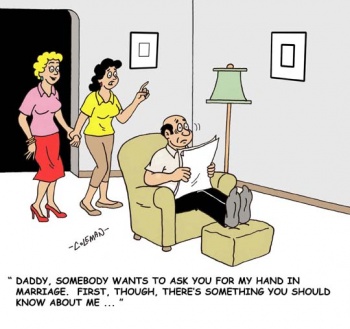 “In our group, there was only one guy who was sexually active. With me and others, it was always thoughts that we would confess. But he would say stuff like ‘I did very well this week, I only hooked up with one guy’… There was a guy there who was really weird, he was there because he had an eating disorder, and he didn’t want to have to find a specific group for that. He thought that anyone with addictive behavior should be there, it should all be one group… After him, they wouldn’t let anyone in who wasn’t gay or bi… One thing I would say about [one of the larger local Columbus churches, which John attended after this one], is that they didn’t put homosexuals in some special class of really bad sinners who needed help, it was anyone who needed help. If you’re addicted to pornography, or crossword puzzles [true story!], the ground was all level, you’re all neglecting your duties as a Christian. Jesus didn’t have to spend more time on the cross for me because I like dick.”
“In our group, there was only one guy who was sexually active. With me and others, it was always thoughts that we would confess. But he would say stuff like ‘I did very well this week, I only hooked up with one guy’… There was a guy there who was really weird, he was there because he had an eating disorder, and he didn’t want to have to find a specific group for that. He thought that anyone with addictive behavior should be there, it should all be one group… After him, they wouldn’t let anyone in who wasn’t gay or bi… One thing I would say about [one of the larger local Columbus churches, which John attended after this one], is that they didn’t put homosexuals in some special class of really bad sinners who needed help, it was anyone who needed help. If you’re addicted to pornography, or crossword puzzles [true story!], the ground was all level, you’re all neglecting your duties as a Christian. Jesus didn’t have to spend more time on the cross for me because I like dick.”
“After college I moved to a small town and became a youth pastor. I didn’t go to counseling or support groups. I did become sexually active for the first time since high school… At the time, I never thought ‘being gay is natural, even though I’m six years into this and nothing’s changed.’ Because of my position as a pastor, I didn’t really have anyone to confess to…”
“After that I started going to counseling, the guy had a Masters and everything, he believed homosexuality was a mental illness… Even if the AMA had decided that it wasn’t a mental illness anymore, the [leaders] told us that the change in the AMA’s books was a political decision, because of pressure, and they didn’t actually do any research.”
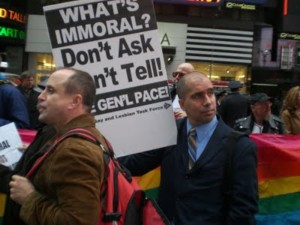 “The first guy told me that once I admitted my sexual abuse, the healing could begin and everything would solve itself… He didn’t just lead the groups, he was also my private counselor, he focused mostly on masturbation which he said was like adultery, cheating on your future wife… That never went anywhere but I was so convinced. I never made anything up in terms of the abuse. Mostly I would confess for twenty minutes, then he’d make me feel guilty, and then we’d pray. The whole thing was about an hour… He fixated a lot on the fact that whenever you were in a position of homosexual sex, it was a position of worship. And so homosexual sex was really just idolatry. Because you spent time on your knees, I guess…”
“The first guy told me that once I admitted my sexual abuse, the healing could begin and everything would solve itself… He didn’t just lead the groups, he was also my private counselor, he focused mostly on masturbation which he said was like adultery, cheating on your future wife… That never went anywhere but I was so convinced. I never made anything up in terms of the abuse. Mostly I would confess for twenty minutes, then he’d make me feel guilty, and then we’d pray. The whole thing was about an hour… He fixated a lot on the fact that whenever you were in a position of homosexual sex, it was a position of worship. And so homosexual sex was really just idolatry. Because you spent time on your knees, I guess…”
“After that group, I moved and I stayed out of the meetings until one of my friends from college who had indoctrinated me into being saved, he had a vision that he needed to save me from my actions… In Columbus I would have sex on the weekends, and then confess at the next meeting. It was described as my addictive cycle… Being in the ex-gay thing didn’t impact my inability to have long-term relationships later in life, I just couldn’t stand to deny it anymore and I would find these anonymous people to have sex with, and never get to know them… Yes it does make it more dangerous. It is amazing that I was always safe. But the fact that you would be safe meant that you were prepared to sin, and that would certainly get in the way.”
“Shortly before I said ‘okay, this isn’t working,’ I was in training at the [mega-church] to become a pastor, very intensive theological training, and I confessed to my accountability partner about my sins and got kicked out of that. Interestingly enough, there was another man there who was still struggling with beating his wife. They just sent him to counseling…”
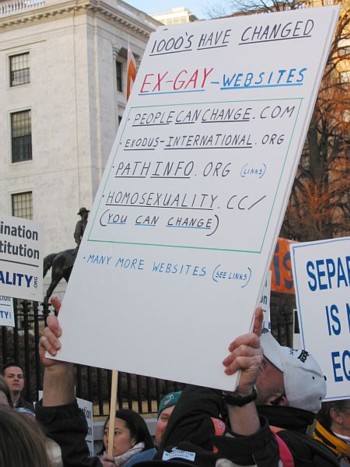 “Eventually they told me I couldn’t go to church anymore and that I just could do counseling until I stopped sinning. And that was the point where I was like, ‘why I am going here, anyway?’
“Eventually they told me I couldn’t go to church anymore and that I just could do counseling until I stopped sinning. And that was the point where I was like, ‘why I am going here, anyway?’
“God I hate cliches, but I think the straw that broke the camel’s back was when this guy in my ‘pursuing sexual wholeness’ group admitted that he raped someone. It got me thinking, ‘why am I classed in the same group as this?’ I mean this guy calls me one night because he needs to talk because he ‘fell’ or ‘sinned’ and by the time the conversation was over I realized he’d raped a teenage girl by sneaking into her room.”
“In the year that it took to recover from all of it, one of my turnaround points, was when I woke up and realized, ‘oh my god, I’m not depressed every day. I am who I am and I can be happy and it’s not a big deal.’ I kept in touch with two people from the church and one of them was confused why I was feeling better and the other one said ‘well of course you’re happy, you’re doing what you want to instead of what you should be doing. Yes you’re happy, but it’s still wrong.’”
“If I ever ran into the guy [again] who got me back into the program, I would probably thank him. The reason is because of my upbringing, I needed to go through the ex-gay thing so I could accept my sexuality. I was able to walk away without feeling a lot of guilt and self-loathing… If I had given up trying to change my sexuality earlier, I would never have come to the conclusion that being gay was okay… Sure, I feel like I missed out a lot in terms of growing up, but I needed the experience to get through life… If I wasn’t gay, there’s no reason I would have changed the views that I grew up with, and I would think that homosexuality was still wrong… “
For those unfamiliar with my first article on re-orientation, I went undercover pretending to be struggling with homosexuality by attending these meetings. The first meeting was about 75 minutes of lecture, followed by almost three hours of group counseling. As I was on the cusp of the younger age group, I was around those who were just coming to terms with their various shames, whether it be masturbation, pornography, or one guy who was cheating on his wife with his wife. One story that pretty much encapsulates the absurdity of the situation was one that didn’t make the first article.
 This kid, who looked about 19, broke up with his long-term girlfriend because he had sex with her. What followed was a fifteen minute conversation about the best way for him to change his phone number and not get fined by the cell phone company. He wanted to do this because if he left his number the same, she would be able to call him, and he could call her, and under those circumstances, he wouldn’t be able to control himself. There was no discussion regarding the fact that changing his number would have no bearing on his ability to call her.
This kid, who looked about 19, broke up with his long-term girlfriend because he had sex with her. What followed was a fifteen minute conversation about the best way for him to change his phone number and not get fined by the cell phone company. He wanted to do this because if he left his number the same, she would be able to call him, and he could call her, and under those circumstances, he wouldn’t be able to control himself. There was no discussion regarding the fact that changing his number would have no bearing on his ability to call her.
When I finally got to speak, I asked if I was even in the right place. Nobody was truly willing to open up, despite almost all of them being there for more than a few weeks. You’d think they’d trust their peers by then. So I began telling my [false] story. I’d had a girlfriend for almost four years who I lived with [true], but I’d been cheating on her for most of the relationship with random guys I’d meet at bars [false]. I loved her and felt bad that I couldn’t just be satisfied with her, but I somehow felt compelled to go out and sleep around. I didn’t want to hurt her by telling her about my urges and how often I had opened her up to possible diseases (though I claimed I had been safe), and I needed help. The leader of the group, a man somewhere in his 40’s or 50’s, instructed me on the solution, that I should pray for forgiveness and seek the answer through following their program. His only quantifiable suggestion came after I questioned how praying would solve the problem in reality. He said I should learn to express my need to have emotional outbursts (sex) by crying. When I explained that I was not much of a cryer, he told me that everyone is, and I just had to try harder. He refused to give me any more suggestions of outlets. When I confessed that I was not all that religious, this was a mini-scandal, and I was basically scolded by the group who had been nearly silent for the previous 2 hours.
 It was about that time that I really got that creepy Scientology feeling. I had been handed an application. I was asked to give money for texts. I was told to be accountable to my group but not speak to anyone outside the group except the lead counselor. The application said the group counselor reserved the right to reveal any information he felt like to my pastor, family, or anyone else he deemed necessary. I told myself it was all a moot point since I was faking the whole thing, but then I remembered about that documentarian who intended to make an objective film on Fred Phelps and the Westboro Baptist Church (the church that pickets gay funerals), and was sucked in and became a believer. His film turned out to be nothing more than pro-Phelps propaganda.
It was about that time that I really got that creepy Scientology feeling. I had been handed an application. I was asked to give money for texts. I was told to be accountable to my group but not speak to anyone outside the group except the lead counselor. The application said the group counselor reserved the right to reveal any information he felt like to my pastor, family, or anyone else he deemed necessary. I told myself it was all a moot point since I was faking the whole thing, but then I remembered about that documentarian who intended to make an objective film on Fred Phelps and the Westboro Baptist Church (the church that pickets gay funerals), and was sucked in and became a believer. His film turned out to be nothing more than pro-Phelps propaganda.
As the final few people discussed their issues, I tried to give honest advice to those asking for help, but there was at least one time where I was shushed by a member of the group, and not because I was interrupting [I wasn’t]. While it had been difficult to avoid screaming out what I actually felt during the four hours (I had nightmares for days after the meeting), it finally ended with a prayer.
There was only one person in the group, Mark, who admitted to have issues with homosexuality. I managed to flag him down before he left the building and discussed my concerns, and hoped he would be willing to talk to me further since he was the only one who could “understand me.” We talked for about fifteen minutes and he gave him his phone number and email, telling me he would be happy to talk with me, despite the earlier instructions to talk to members outside of group “therapy.”
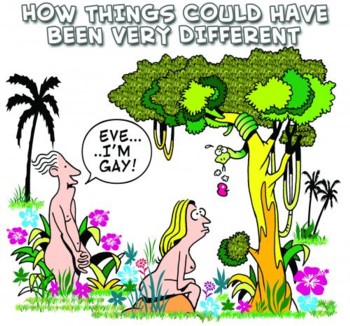 When I spoke to him on the phone a few days later, I attempted to make a further emotional connection so I could figure out what brought him to the group. However, he did a lot of deflecting, and he had clearly listened to the group leader, as his reactions tended to sound like blocking me out via passive aggression. While he was willing to quell my feelings on the mismanaging and emotional constipation in the group, mostly when I would disagree with the methods, he would say things like, “I’m not looking to judge you, far from it. As far as your feelings, you’re coming from a different perspective.”
When I spoke to him on the phone a few days later, I attempted to make a further emotional connection so I could figure out what brought him to the group. However, he did a lot of deflecting, and he had clearly listened to the group leader, as his reactions tended to sound like blocking me out via passive aggression. While he was willing to quell my feelings on the mismanaging and emotional constipation in the group, mostly when I would disagree with the methods, he would say things like, “I’m not looking to judge you, far from it. As far as your feelings, you’re coming from a different perspective.”
When I tried to make it more about him, and why he was there, he was still a bit vague.
“I’m using this group to supplement my 1 on 1 counseling. I started that counseling about two years ago. I’ve had some relapses, I need healing, my life was out of control. There are some things that I’ve used in counseling, suggestions, getting to the root of the problem, get rid of the junk. It helps us deal with the problem. What’s the emotion when you want to jack off, when you want to masturbate? When I need love, you and I start with SSA [same sex attraction]. What am I craving right now? Am I craving a guy? After that’s gone, what am I feeling? What is lacking? What is what we want and like. You think about it for five minutes, you’ll be amazed at what you can find.”
But then he’d fall into the typical non-responses, which could either have been to avoid any kind of discussion (or perhaps confrontation in his mind), even if I misunderstood something or there was an obvious disagreement.
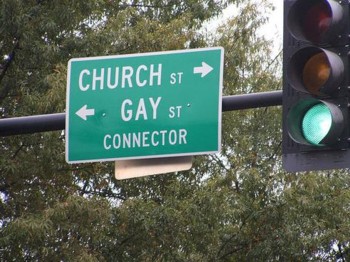 “I tell you what, let’s do this… Keep that in mind. That is part of who you are, that is how you think, that’s your value system. That’s how you feel. I have to focus on my emotions and my feelings.”
“I tell you what, let’s do this… Keep that in mind. That is part of who you are, that is how you think, that’s your value system. That’s how you feel. I have to focus on my emotions and my feelings.”
Thirty minutes later and I had gotten nowhere. But I knew I would have a chance to go to a second meeting before the first article ran so I could avoid exposure for at least a week.
Instead of a lecture, that week we were faced with a testimony. Not being religious at all, I was unsure what this was. We were told that the man who was going to give his testimony was the head of a smaller group that dealt exclusively with homosexuality. That sounded perfect for me, and I assumed I’d just wait until his spiel was over and approach him.
But no one is prepared for a testimony. Basically, a testimony is a person telling their life story and all the sins they’ve committed before becoming born again. In fact, the guy who ran the discussion group the previous week gave me two copies of his testimony on a CD, perhaps so I could give one to a friend or family member who liked hearing about other people’s sins.
 Since I had no idea what to expect, after he introduced himself, I thought he was just going to tell a simple story of change. But not thirty seconds after he began and not having revealed a thing, he collapsed on the ground. I thought he had just died, and we should call for paramedics, but as people came over to help him, it turned out he was just overcome with emotion and the power of Jesus Christ. He cried on the floor for about fifteen minutes, before finally allowing himself to be helped up. Imagine James Brown trying to discard the cape his handlers try to put on him, but picture him as a pudgy self-loathing 40 year-old frat boy, and you’d get the exact idea.
Since I had no idea what to expect, after he introduced himself, I thought he was just going to tell a simple story of change. But not thirty seconds after he began and not having revealed a thing, he collapsed on the ground. I thought he had just died, and we should call for paramedics, but as people came over to help him, it turned out he was just overcome with emotion and the power of Jesus Christ. He cried on the floor for about fifteen minutes, before finally allowing himself to be helped up. Imagine James Brown trying to discard the cape his handlers try to put on him, but picture him as a pudgy self-loathing 40 year-old frat boy, and you’d get the exact idea.
When he finally recovered and began speaking, discussing his flaws and sexual exploits, the one thing that came to my mind was, “boy, he sure sounded happy.” Perhaps realizing this, every so often he would try to make it sound like even if he liked it, it was the wrong thing to do. His depression and falling away from his homosexual sins appeared to be motivated by his break-up with his boyfriend of five years. He got depressed, went into a funk, and then suddenly found Jesus.
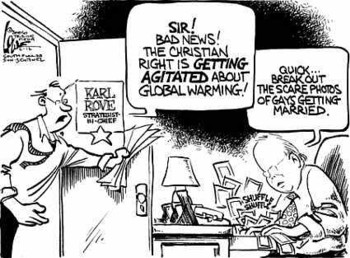 We’ve all had bad break-ups and they usually cause depression, anxiety, and loneliness. Some of them may even cause us to change our ways in order to improve the way we are treated. But I can’t imagine deciding to make yourself feel guilty for every thought or action you’ve ever committed, just because you’re in a bad mood.
We’ve all had bad break-ups and they usually cause depression, anxiety, and loneliness. Some of them may even cause us to change our ways in order to improve the way we are treated. But I can’t imagine deciding to make yourself feel guilty for every thought or action you’ve ever committed, just because you’re in a bad mood.
As expected, the description of his conversion was 100% unconvincing, not helped by his cracked voice explanation that, after three years of celibacy, he was finally ready to date women. He had never done it before, never been attracted to one, but all of a sudden he was ready to find the right woman to marry. Forget the fact that he’s clearly fooling himself, isn’t that just cruel to her?
After his testimony, I approached him about the times and location of his meetings. As luck would have it, I had been trying to find out the location for weeks previous, but the security measures are ridiculous, especially if someone is legitimately looking for help. It required emailing the webmaster and convincing him to give you the password to look at the PDF file, which was the application. After you’d filled out the application (several pages long), you were supposed to email it back to them. They would then decide if you were worthy of being interviewed, in order to be able to join the group. Even though I’d explained the entire situation to him, the group leader still was rather mush mouthed about the location and gave me some vague cross streets, but no specific address.
Knowing that my article was coming out a few days later, I felt freed up to really air my grievances about the group. I was almost sad about the fact that this time, we were split into two, and there were only six people in my group. That still didn’t stop the strange closed-door secrets. We had two people leading our group who told us that they weren’t going to confess what had happened to them that week because they’d already done it privately with the overall group leader.
 Since I was making up what happened, it didn’t matter to me, but I felt for the other guys, who theoretically would be pouring their heart out to people who didn’t trust us or think we were worthy of their faults and sins. Again, people confessed to watching porn, masturbating while their wife was away for six weeks, and pleasantly remembering ex-girlfriends, surely the worst offenses known to man and God. When given my chance, I opened up and raged on for a few minutes, talking about how none of it makes any sense, why is everyone so constipated, what are we supposed to get out of this, etc. I did make sure to hide behind the guise of things I didn’t understand about the group and needed them explained to me, so I didn’t appear like an outright phony. As expected, the responses were of the “that’s your view, and you should stick with it” variety, never answering any questions at all, just avoiding them.
Since I was making up what happened, it didn’t matter to me, but I felt for the other guys, who theoretically would be pouring their heart out to people who didn’t trust us or think we were worthy of their faults and sins. Again, people confessed to watching porn, masturbating while their wife was away for six weeks, and pleasantly remembering ex-girlfriends, surely the worst offenses known to man and God. When given my chance, I opened up and raged on for a few minutes, talking about how none of it makes any sense, why is everyone so constipated, what are we supposed to get out of this, etc. I did make sure to hide behind the guise of things I didn’t understand about the group and needed them explained to me, so I didn’t appear like an outright phony. As expected, the responses were of the “that’s your view, and you should stick with it” variety, never answering any questions at all, just avoiding them.
Even after the meeting, when I talked 1-on-1 with one of our group leaders, he smiled, agreed with the most meager suggestions and talked in a circle for almost thirty minutes. I made sure to wait for Mark outside to see how he felt and if I could contact him again.
Happily, he did, and Mark and I talked on the phone for an hour, and my digging apparently didn’t seem suspicious, only looking for validation about “our” situations. He did eventually reveal that he was trying to stop his homosexual actions because his life was spiraling out of control, surely a noble reason, but it sounded like he was blaming his homosexuality instead of the real issues his religion forced him to ignore or suppress.
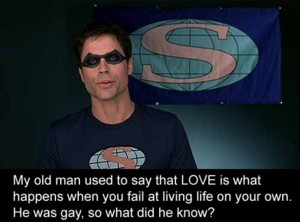 Since I had gone to the effort of obtaining the application for the smaller second group, I wanted to at least experience one meeting. But each group’s application was basically an experience unto itself, 3 pages worth of intrusive questions that would seem out of line from the FBI. For the smaller group, I thought a new fake name might be enough, but like the other, larger church, just trying to change wasn’t enough. Along with the typical questions about name, phone number and email, they wanted to know about my commitment to the church, which church I went to, my pastor’s name, whether I’d tried other ministries of this type before, contact information of who to contact in case of emergency, etc (believe it or not, ex-gay internet forums do the same thing, and require many pages of private information before being allowed to join). But that was just the beginning, the second page was even worse; was I suicidal, was I “suffering” from heterosexual addiction or homosexuality (I guess homosexuality is inherently addictive), when was the last I had sex, do I live in a gay relationship, do I attend therapy of any kind (as well as whether I had a host of various diagnosis, from co-dependency to “romantic or sexual thought life”), whether or not I’d been convicted of a sexual felony, or if I was involved in gay activism? But my favorite question asked whether or not I had been “saved by the blood of Christ” and if so, how long?
Since I had gone to the effort of obtaining the application for the smaller second group, I wanted to at least experience one meeting. But each group’s application was basically an experience unto itself, 3 pages worth of intrusive questions that would seem out of line from the FBI. For the smaller group, I thought a new fake name might be enough, but like the other, larger church, just trying to change wasn’t enough. Along with the typical questions about name, phone number and email, they wanted to know about my commitment to the church, which church I went to, my pastor’s name, whether I’d tried other ministries of this type before, contact information of who to contact in case of emergency, etc (believe it or not, ex-gay internet forums do the same thing, and require many pages of private information before being allowed to join). But that was just the beginning, the second page was even worse; was I suicidal, was I “suffering” from heterosexual addiction or homosexuality (I guess homosexuality is inherently addictive), when was the last I had sex, do I live in a gay relationship, do I attend therapy of any kind (as well as whether I had a host of various diagnosis, from co-dependency to “romantic or sexual thought life”), whether or not I’d been convicted of a sexual felony, or if I was involved in gay activism? But my favorite question asked whether or not I had been “saved by the blood of Christ” and if so, how long?
Now I’m quite aware that being born again is clearly the most important facet of these people’s lives, and always the turning point in their lives, so they’d obviously know approximately how long. But to actually answer the question in extremely formal paperwork, which has to take the specificity of the experience out of it, really reveals how much of an impersonal and rote conversion it must have been. Imagine your high school gym teacher filling out some form which yes or no check-boxes. “Right handed?” “Require headgear?” “Born again?”
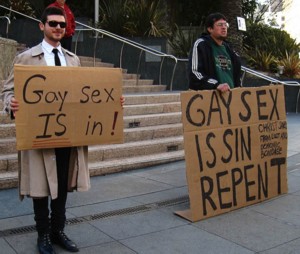 The unfortunate part was that other than making up an address for myself, and the name and phone number for my emergency contact, I wasn’t able to be creative and have fun with it. Luckily, the third page asked for a detailed reason for why you were there. Now I had just recently injured my head being absent minded about home furniture placement, requiring a few stitches. I decided that it was best to use the injury in the midst of a completely ridiculous and fabricated story. I wrote that as I was coming out of a gay bar a few weeks before, someone had thrown a bottle at my head and screamed “fag” as they drove by. This incident caused me so much shame and fear that I needed to stop being gay, so people would no longer throw bottles at my skull. Intentionally specious reasoning. I figured that it would be best to challenge their ideals by presenting a situation that was exactly the wrong reason to want to change, because all you’ve done is validate the guy throwing the bottle. Would their fear of God and insistence on forcing their misery on others overcome such a wrongheaded decision by a perspective member?
The unfortunate part was that other than making up an address for myself, and the name and phone number for my emergency contact, I wasn’t able to be creative and have fun with it. Luckily, the third page asked for a detailed reason for why you were there. Now I had just recently injured my head being absent minded about home furniture placement, requiring a few stitches. I decided that it was best to use the injury in the midst of a completely ridiculous and fabricated story. I wrote that as I was coming out of a gay bar a few weeks before, someone had thrown a bottle at my head and screamed “fag” as they drove by. This incident caused me so much shame and fear that I needed to stop being gay, so people would no longer throw bottles at my skull. Intentionally specious reasoning. I figured that it would be best to challenge their ideals by presenting a situation that was exactly the wrong reason to want to change, because all you’ve done is validate the guy throwing the bottle. Would their fear of God and insistence on forcing their misery on others overcome such a wrongheaded decision by a perspective member?
The fact that the meeting was in the middle of nowhere and in a notoriously lower class neighborhood gave credence to the notion that religion takes advantage of the poor. It was a church that almost looked boarded up, as if its existence itself was a secret. As I pulled on each locked door, I realized that the shame inherent in the process wasn’t just subtext, but, in this case, the only text.
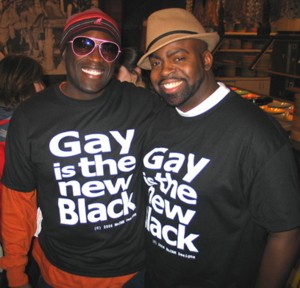 When I finally found the door which was open (the basement door!), the passageway resembled something closer to the Underground Railroad, labyrinth as it was. I was the second to arrive, the only other guy was the same one who had told me about the meeting in the first place, still looking like a confused and sleep deprived frat boy.
When I finally found the door which was open (the basement door!), the passageway resembled something closer to the Underground Railroad, labyrinth as it was. I was the second to arrive, the only other guy was the same one who had told me about the meeting in the first place, still looking like a confused and sleep deprived frat boy.
He greeted me, not recognizing me (I had gone incognito with a long hair and beard combo), and in his jittery tone, asked if I was new. When I later found out he would be leading the meeting, I wasn’t surprised that the membership was rather low, how could you have faith in someone who was so nervous and lacked confidence? I had handed him my application with tempered excitement, it was like barely being able to control your interference while a friend reads something rather personal that you’ve written, and I was mildly hurt when he barely looked at it. I asked if there was something wrong, as I had previously figured the application must be of utmost importance if the only way to get it was through all these hoops and hurdles.
By the time the meeting was supposed to have started; only one other person had shown up. We waited another fifteen minutes and people began filing in. To no surprise at all, every one of the 7 there were white. Whether this self-hatred is a variation of white guilt, I’m not sure, but it appears to be based on the notion that since white Christians have never really been victimized by hate in this country, they direct it inward. This became more obvious when the final member of the group arrived. Apparently, he was the actual group leader, a very intense but studious black man, who was getting married a week later, and therefore was leaving the group.
 Each member did their confessions, and when they were done, there would be questions. For such an invasive application you’d assume that it would cause the members to be more open, but again, my bogus story was far more direct and “honest” than anyone else was willing to share, and I was the most honest liar there.
Each member did their confessions, and when they were done, there would be questions. For such an invasive application you’d assume that it would cause the members to be more open, but again, my bogus story was far more direct and “honest” than anyone else was willing to share, and I was the most honest liar there.
What I was not expecting is that the entire two hour meeting was focused almost solely on me. My questions tended to be confusion about guilt and the way the bible is misread in order to make you feel like a horrible, unworthy person. Again, I got away with this by seeming curious, not angry. Our new black king would constantly reinforce that the problem was that I was not a believer, what I was describing with myself was a problem with sex addiction, and maybe I shouldn’t be there. But, you know, politely… I used this as an opportunity to pick apart the obvious issues within the group. When anyone talked about their love of the lord or what happened that week, they claimed to be happy, but they looked miserable. The man on my left was the gayest man I’d ever met, to the point of embarrassing femininity, double lisping, limp-wristed, pinky in the air, so swishy he needed a clothing line named after him, and so I needled, subtly regarding who he thought he was fooling [with a wedding ring, to boot!].
The debate continued with the discussion of Maximized Manhood, with which we were to have read six chapters in preparation for this meeting. This misogynist screed was written in 1982 (much like everything I saw, each text was extremely dated), by a pastor who viewed himself as strong-willed and honest, as opposed to what was clearly going on; he was a mean, bitter asshole who picked apart people’s faults and told them it was all in the name of Jesus. And that doesn’t include his overt piousness. Speaking of a woman in a wheelchair, dying of cancer, who has said nothing to him, and has rejected God, he writes, “we had talked only for a few minutes, but I could tell by looking at her that she wanted to talk to Jesus.” He used vague, hard to fathom stories to back up his points and the specific ones are horrifying; telling a widow she needs to get over herself, an abused divorcee is an adulterer for desiring sex, a husband leaves his wife and kids for women and money, and when he comes back, she is supposed to forgive him.
![]() The fact that I brought up any of this was a distraction to our leader. Other people started agreeing with me, before he eventually said that the reason I couldn’t understand the text was because I wasn’t a believer, and I would never see their point of view. He spent the remaining ten minutes dictating the meaning of each section of the text, with no thought or opportunity for discussion; it just was as he said it was.
The fact that I brought up any of this was a distraction to our leader. Other people started agreeing with me, before he eventually said that the reason I couldn’t understand the text was because I wasn’t a believer, and I would never see their point of view. He spent the remaining ten minutes dictating the meaning of each section of the text, with no thought or opportunity for discussion; it just was as he said it was.
These strategies of evasiveness and dictation are quite common. In my reading of many of the ex-gay books, the former Christian anger against gays is replaced by pointing and observing, as if they were animals in a zoo. In A Parent’s Guide To Preventing Homosexuality, anyone with abnormal thoughts of any kind is to be “converted.” If you are a male and have female friends you must be gay. If you have a distant father and close mother, you must be gay. You should respect your child’s feelings and tell him to express them, but then subtly try to change them. A father must wrestle with his son on the carpet and take showers with him. “My adult homosexual clients rarely report having shared these activities with their fathers.”
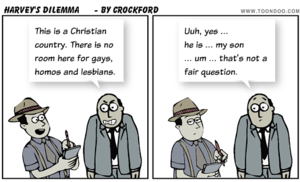 Gay behavior is so misunderstood and shied away from direct contact that even an autobiographical conversion book is sterile. John Paulk, former ex-gay poster boy and Focus on the Family puppet, now disgraced hypocrite, has all of his characters in Not Afraid to Change talk in “aw-shucks” language using phrases like “you bet,” and “he’s gay all right.” Even his descriptions of his time as an escort are completely innocent. All he gives are massages. The whole book is very detailed except for the homosexual acts, at which point it backs off. The book is theoretically lascivious, but at the same time obviously sanitized for responsibility and content. It is written as if his conversion was just a decision he made one day, because his gay life was just something he could escape, like a vacation (read the book anyway, it is unintentionally hilarious).
Gay behavior is so misunderstood and shied away from direct contact that even an autobiographical conversion book is sterile. John Paulk, former ex-gay poster boy and Focus on the Family puppet, now disgraced hypocrite, has all of his characters in Not Afraid to Change talk in “aw-shucks” language using phrases like “you bet,” and “he’s gay all right.” Even his descriptions of his time as an escort are completely innocent. All he gives are massages. The whole book is very detailed except for the homosexual acts, at which point it backs off. The book is theoretically lascivious, but at the same time obviously sanitized for responsibility and content. It is written as if his conversion was just a decision he made one day, because his gay life was just something he could escape, like a vacation (read the book anyway, it is unintentionally hilarious).
When I watched Sad To Be Gay, a British documentary about a gay man who tries to change his sexuality, that same tone of, “if you don’t agree with me completely, I can’t hear you” is what comes through the loudest. Since re-orientation is an American phenomenon, he has to travel to Memphis to have it done (all white people in the meetings again). This is probably “Americans believe in the quick fix,” and so a two week course is apparently all it takes to de-gay you. Much like John in the interview above, the subject is horrified when he attends a lecture by a man claiming to be holy, but at that time, was on trial for molesting children.
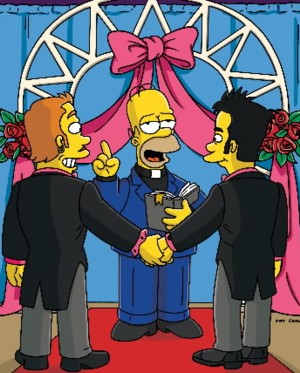 It brings to mind several questions about conversion therapy; is this another scam to bring people into religion by catering to further insecurities? Is it a con, or a self-delusion? Why can the process only be done in a very specific way, and why must it follow the doctrines of the bible? Why does someone have to follow a very specific religion in order to be accepted among the unacceptable? Why can’t people trust themselves enough to just be happy, and not think there must be something wrong?
It brings to mind several questions about conversion therapy; is this another scam to bring people into religion by catering to further insecurities? Is it a con, or a self-delusion? Why can the process only be done in a very specific way, and why must it follow the doctrines of the bible? Why does someone have to follow a very specific religion in order to be accepted among the unacceptable? Why can’t people trust themselves enough to just be happy, and not think there must be something wrong?
Even if there is a God, why would he want you to suffer for the simple act of being yourself?



